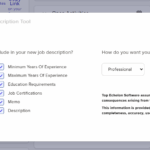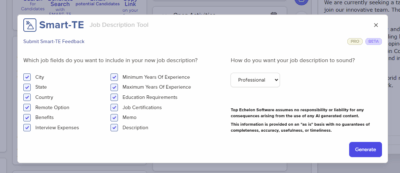Scaling a recruiting agency is both an exciting opportunity and a formidable challenge. As your agency grows, so do the complexities of managing candidates, clients, and the processes that connect them. What may have once been manageable through manual workflows or basic tools quickly becomes inefficient and unsustainable at scale. Without the right systems in place, scaling can lead to overwhelming workloads, decreased productivity, and potential client dissatisfaction.
This is where recruiting software comes in. As agencies expand, recruiting software becomes critical for streamlining workflows, automating repetitive tasks, improving candidate sourcing, and enabling better client communication. These platforms not only enhance efficiency but also allow agencies to scale without sacrificing quality or candidate experience.
In this article from Top Echelon Recruiting Software, we will explore how recruiting software can support and accelerate the growth of your recruiting agency, focusing on the ways it can help you handle larger talent pools, increase operational efficiency, and improve client and candidate experiences. By adopting the right recruiting technology, you can scale your agency effectively while maintaining a high level of service.
The Challenges of Scaling a Recruiting Agency
Before delving into how recruiting software can assist with scaling, it’s essential to understand the key challenges that agency recruiters face as they grow their operations:
- Increased Candidate Volume: As your agency grows, so does the number of candidates you need to source, screen, and manage. Without the right tools, tracking hundreds or even thousands of candidates manually can become a nightmare.
- Managing More Clients: Scaling means taking on more clients, each with different expectations, timelines, and hiring needs. Juggling multiple clients and ensuring they all receive timely updates and quality candidates can strain your team’s capacity.
- Maintaining Quality: With more candidates and clients in the pipeline, maintaining the same high standards of service becomes challenging. Agencies risk rushing through the recruitment process, leading to mismatches between candidates and roles, higher turnover, and decreased client satisfaction.
- Operational Inefficiencies: As your agency scales, administrative tasks like scheduling interviews, sending follow-up emails, and processing candidate data grow exponentially. Without automation, these tasks can overwhelm your team, leading to bottlenecks and errors.
- Recruiter Burnout: Scaling often comes with increased workloads, which can lead to burnout among your recruiters. Overworked teams are less productive, less motivated, and more likely to make mistakes that could harm your reputation.
These challenges highlight the importance of having scalable processes and tools in place. Recruiting software is designed to address these specific pain points, allowing your agency to grow without compromising efficiency or service quality.
1. Streamlining Candidate Sourcing and Management
One of the biggest challenges of scaling a recruiting agency is managing an increasing volume of candidates. Recruiting software helps by streamlining the candidate sourcing and management process, allowing your team to handle larger pools of talent without losing track of details.
a) Multi-Channel Sourcing Integration
Recruiting software enables agencies to source candidates from multiple channels—job boards, social media, internal databases, and referrals—all in one place. Instead of logging into separate platforms to find candidates, your team can access and manage all candidate data from a single system. This reduces time spent on manual sourcing and ensures that no candidates slip through the cracks.
- AI-Powered Search and Matching: Many recruiting software platforms leverage artificial intelligence to automate candidate searches. These tools can sift through large volumes of resumes and profiles, matching candidates to job descriptions based on specific skills, experience, and qualifications. This reduces the time spent manually reviewing applications and improves the quality of shortlists.
- Talent Pool Management: As your agency grows, building a robust talent pool becomes critical to quickly filling roles. Recruiting software allows agencies to categorize candidates based on their skills, industries, and availability, creating segmented talent pools that can be easily tapped into when new job orders come in. This proactive approach to candidate management enables faster placements and better matches.
b) Centralized Candidate Database
As the volume of candidates increases, maintaining accurate and up-to-date records becomes more difficult. A centralized candidate database offered by recruiting software ensures that all candidate information—resumes, contact details, interview notes, and communication history—is stored in one place. This allows recruiters to access candidate profiles easily and ensures that no important information is lost or duplicated.
- Candidate Relationship Management (CRM): Recruiting software often includes CRM tools that help agencies nurture relationships with candidates over time. By tracking communication history, preferences, and career goals, recruiters can provide a more personalized candidate experience, even as the agency scales. Automated reminders ensure recruiters follow up with candidates at key points in the process, preventing disengagement.
By streamlining candidate sourcing and management, recruiting software enables agencies to scale their talent acquisition efforts without increasing administrative burdens.
2. Automating Repetitive Tasks to Boost Efficiency
As your agency scales, so does the volume of repetitive tasks that recruiters must handle, such as scheduling interviews, sending follow-up emails, and processing candidate data. Without automation, these tasks can quickly overwhelm your team and reduce overall efficiency. Recruiting software helps by automating many of these time-consuming tasks, allowing recruiters to focus on higher-value activities.
a) Automated Interview Scheduling
Scheduling interviews for multiple candidates across different time zones and client schedules can be a logistical nightmare. Recruiting software simplifies this process by integrating with calendars and offering automated scheduling tools. Candidates and clients can select available time slots from a pre-set list, reducing the need for back-and-forth emails and ensuring interviews are scheduled efficiently.
b) Email Automation
Recruiting software allows recruiters to automate many routine communications, such as application confirmations, interview invitations, follow-up messages, and rejection letters. This ensures that candidates receive timely updates without recruiters having to manually send each email.
- Personalization at Scale: While automation saves time, recruiting software also allows for personalization. Recruiters can create templates for different stages of the hiring process and personalize them with candidate-specific details, ensuring that communication feels tailored and engaging, even when sent to large volumes of candidates.
c) Resume Parsing and Data Entry Automation
Manually entering candidate information into a database is time-consuming and prone to errors. Recruiting software automates this process through resume parsing technology, which extracts key details from resumes and automatically populates candidate profiles. This reduces the risk of data entry mistakes and ensures that profiles are created quickly and accurately.
By automating repetitive tasks, recruiting software allows recruiters to handle more candidates and clients without sacrificing efficiency or accuracy. This helps prevent bottlenecks, reduce recruiter burnout, and improve overall productivity.
3. Enhancing Client Communication and Transparency
As your agency scales, managing client relationships becomes more complex. Clients expect regular updates on the status of their job orders, feedback on candidates, and transparency into the recruitment process. Recruiting software enhances client communication by offering tools that improve transparency, collaboration, and responsiveness.
a) Client Portals for Real-Time Updates
Many recruiting software platforms offer client portals that provide clients with real-time access to the status of their job orders. Clients can log in to the portal to view candidate profiles, track progress, and leave feedback at their convenience. This level of transparency builds trust and reduces the need for constant follow-up emails or phone calls from clients seeking updates.
- Faster Decision-Making: When clients have easy access to candidate information and can provide feedback directly through the platform, decision-making becomes faster and more streamlined. This reduces delays in the hiring process and increases the likelihood of successful placements.
b) Collaboration Tools for Seamless Feedback
Recruiting software includes collaboration tools that allow clients to participate in the recruitment process more effectively. Clients can review candidate profiles, rate candidates based on specific criteria, and leave comments or feedback directly within the platform. This ensures that client feedback is captured accurately and reduces the risk of miscommunication.
c) Custom Reporting and Analytics
Recruiting software provides real-time reporting and analytics tools that allow agencies to generate custom reports for clients. These reports can include key metrics such as time-to-fill, candidate-to-interview ratios, and sourcing breakdowns. By offering data-driven insights, agencies can demonstrate their value to clients and provide a clearer understanding of the recruitment process.
By improving client communication and collaboration, recruiting software helps agencies scale while maintaining strong relationships with their clients. This leads to higher client satisfaction and increased repeat business.
4. Data-Driven Decision Making for Optimized Performance
As your agency scales, making data-driven decisions becomes essential for optimizing performance and ensuring long-term success. Recruiting software provides powerful analytics tools that allow agencies to track key performance metrics, identify trends, and make informed decisions.
a) Tracking Key Performance Indicators (KPIs)
Recruiting software allows agencies to track important KPIs, such as:
- Time-to-Fill: The average time it takes to fill a position from the moment a job order is received.
- Source-of-Hire: Which sourcing channels are delivering the best candidates.
- Candidate Conversion Rates: The percentage of candidates who move from one stage of the recruitment process to the next (e.g., from interview to offer).
- Client Satisfaction Metrics: Feedback from clients regarding the quality of candidates and the efficiency of the process.
By tracking these KPIs, agencies can identify bottlenecks, optimize sourcing strategies, and improve overall recruitment performance.
b) Sourcing Analytics
Recruiting software tracks where candidates are coming from—whether it’s job boards, social media, referrals, or internal databases. By analyzing this data, recruiters can determine which sourcing channels are delivering the highest-quality candidates and focus their efforts accordingly.
- Optimizing Sourcing Spend: With sourcing analytics, agencies can allocate resources more effectively. For example, if a specific job board consistently delivers high-quality candidates, agencies can increase their investment in that platform, while reducing spending on underperforming channels.
c) Predictive Analytics
Some advanced recruiting software platforms include predictive analytics features that help agencies anticipate hiring trends, forecast candidate availability, and identify potential drop-off points in the recruitment process. These insights allow agencies to be more proactive in managing their pipeline and ensure they are prepared for client needs.
By leveraging data-driven insights, recruiting software enables agencies to optimize their processes, improve candidate and client outcomes, and scale more strategically.
5. Supporting Global Expansion with Compliance and Localization
For agencies looking to scale internationally, recruiting software can help navigate the complexities of global expansion. Different countries have varying labor laws, data protection regulations, and compliance requirements. Recruiting software helps agencies stay compliant while managing a global talent pool.
a) Compliance with Local Labor Laws
Recruiting software includes compliance features that ensure your agency adheres to local labor laws, including regulations around background checks, offer letters, and employment contracts. For example, in the European Union, recruiting software that supports GDPR compliance ensures that candidate data is collected, processed, and stored in accordance with data privacy regulations.
b) Multi-Language and Localization Support
If your agency is expanding into new regions, recruiting software that supports multiple languages and localization can be a significant advantage. These platforms allow recruiters to manage candidates and clients in different languages, ensuring that communication remains seamless across borders.
By supporting global compliance and localization, recruiting software enables agencies to expand internationally with confidence and efficiency.
Conclusion
Scaling a recruiting agency is a complex and challenging endeavor, but with the right tools in place, it can be done efficiently and successfully. Recruiting software is critical to managing larger candidate pools, streamlining workflows, automating repetitive tasks, and improving client communication—all of which are essential to scaling without sacrificing quality.
From multi-channel sourcing and candidate relationship management to data-driven decision making and global compliance, recruiting software provides the tools and capabilities agencies need to grow their operations while maintaining a high level of service. By investing in the right technology, agencies can scale strategically, increase productivity, and deliver better results for both candidates and clients.
As your agency continues to grow, adopting a robust recruiting software platform will be one of the most important decisions you make, ensuring that your team can handle the challenges of scaling while remaining agile, efficient, and competitive.








